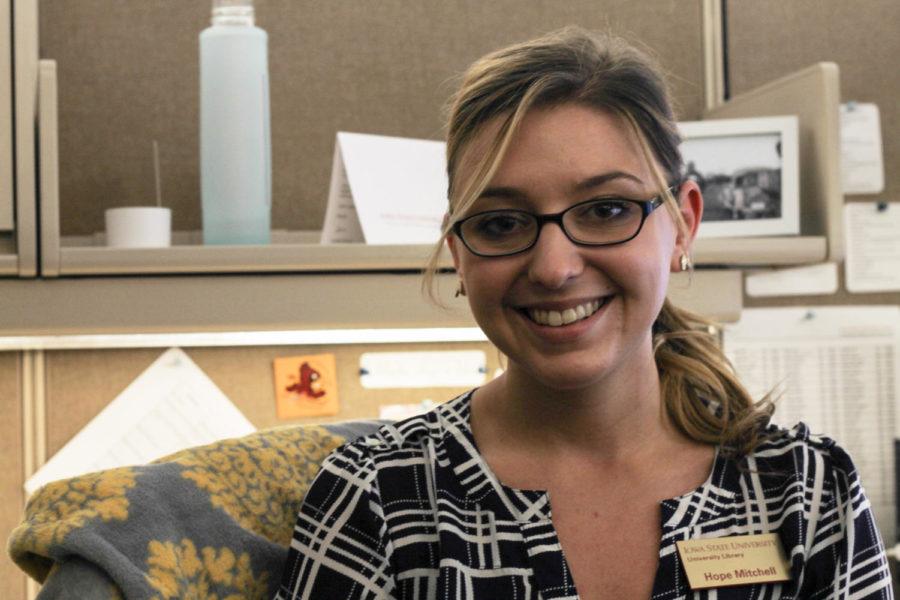Historian hunts hidden past of ‘world’s oldest profession’
Meredith Kestel/Iowa State Daily
Hope Mitchell, an associate at Parks Library, was awarded for her esteemed work in historical research on prostitution.
October 21, 2014
Prostitute Roving Clara shot a man in a sleigh and fled from the police. She was never seen again.
Her story is just one of many Hope Mitchell uncovered while writing her thesis on the world’s oldest profession.
Mitchell, who works at Parks Library overseeing the digital repository, wrote her master’s thesis on prostitution called “Sacrificing our daughters: changing perceptions of prostitution in Iowa, 1880-1915,” and she won this year’s Master’s Thesis Award from the Iowa History Center.
Mitchell received the award Oct. 10, along with a plaque and a $1,000 prize.
“Meeting your boyfriend’s parents and telling them that I study prostitution — they were very accepting, but you kind of hesitate to tell people,” Mitchell said. “Honestly, people are kind of excited to talk about it. There aren’t too many venues where it is acceptable to talk about prostitution.”
She said her family was also excited for her and was open to her research on the taboo topic.
“It was interesting telling my family,” Mitchell said. “They’re very open and receptive. I don’t know that they ever thought that I would end up studying prostitution, but my mom was really excited about it. They were like, ‘I think you need to watch this TV show,’ but obviously a TV show is not the same thing [as actual research].”
When conducting her research, Mitchell found that there was a huge gap in information. While it was easy to find information about prostitution in the Northeast and the West, the Midwest was rarely covered.
“The idea of prostitution doesn’t fit with our understanding of what the Midwest should be,” Mitchell said. “I think Midwestern history is something that tends to get overlooked by historians. We think it’s just farming history and, by overlooking these other aspects of our history, we’re undercutting what Midwest history could be.”
To aid in her research, Mitchell used a variety of sources including newspapers, reports of reform societies and district court and parole records.
When trying to obtain court records, Mitchell ran into a problem when she learned she would have to petition a judge to see the records.
“I was very confused [as to] why I would have to petition a judge to see public records,” Mitchell said. “Frankly, it’s public record that affects nobody because these people died 100 years ago. It was kind of tricky, but then, once I found the right people who were interested in what I was doing, they were very helpful.”
That’s when John Zeller, historian and long time newspaper reader, came to the rescue. Zeller, formerly of the State Historical Society of Iowa, had two boxes full of information he had kept that related to her research.
He said he was more than happy to get the boxes out of his house and give them to someone who could put them to better use.
Zeller, attended Mitchell’s award ceremony, which took place at the Iowa History Center at Simpson College.
“I was proud for her,” Zeller said. “She was very brave. She took the hardest topic of her class. I guess that’s what they say, ‘No guts, no glory.’ I was very glad for her.”
Mitchell’s advisor, Pamela Riney-Kehrberg, said when she learned that Mitchell had won the award she was excited but not at all surprised.
“I think [she] shines light on information that we didn’t previously have on Iowa, and it looks at a complex problem for people in Des Moines and how they went about solving that problem and the various grassroots efforts they organized to deal with the issue,” Riney-Kehrberg said. “She’s an innovative and creative scholar.”
Mitchell’s 101-page publication is generating a lot of local interest. She has been offered to write a journal article for “The Annals of Iowa.” She will also be presenting her reserach at the Des Moines Historical Society as well as appearing on “Great Day,” a talk show on KCWI Channel 23.
These days, Mitchell spends her time working in the digital repository at Parks Library, preserving all things published by graduate students, faculty and authors at Iowa State.
“My interest has always initially been that I wanted to work in museums,” Mitchell said. “I think my real interest is in preservation. I think working here kind of ties in with preservation, and I think it’s the same thing with libraries and museums preserving our cultural heritage, preserving what we’re producing now and for the future.”
To read Mitchell’s thesis click here.







